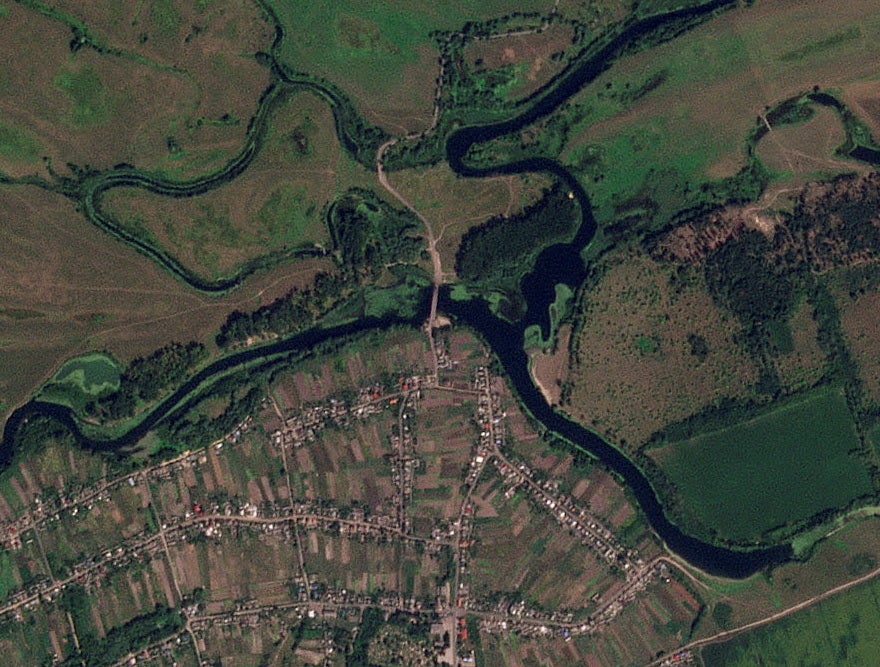Ukraine strikes third bridge in Kursk as part of cross-border attack into Russia
Ukrainian war analysts suggest Kyiv’s troops could look to take hundreds more square miles of the Kursk region

Russia has confirmed that Ukrainian forces have destroyed a third bridge in the Kursk border region in as many days, severing vital supply lines to Moscow’s forces defending the area against Kyiv’s surprise cross-border assault.
The bridge, located in the village of Karyzh on the River Seym, which runs parallel to the Ukrainian border, is said to have been damaged during an attack late on Sunday night.
Russian state media’s top propagandist, Vladimir Solovyov, published a video statement to his channel on the Telegram messenger app, from a representative of Russia’s Investigative Committee, confirming the bridge had been damaged on Monday morning.
It is highly unusual for Kremlin-approved state media reports to disclose information highlighting Russian military failures, and Moscow strictly controls what is and is not published. As with most Russian claims about strikes by Ukraine, the statement claimed the attack hit “residential buildings and civilian infrastructure” without providing any evidence whatsoever.
“On August 18, as a result of targeted shelling using rocket and artillery weapons at residential buildings and civilian infrastructure in the village of Karyzh in the Glushkovsky District of the Kursk Region, the third bridge across the Seim River was damaged,” the spokesperson said, using the Russian spelling for the waterway.
Ukraine’s air forces declined to comment on the report when approached.
Ukraine’s air force commander Mykkole Oleschuk did, however, say on Sunday that they had destroyed a second strategic bridge over the Seym, limiting the supply capacity of a Russian group opposing the Ukrainian advance.
The first bridge was destroyed on Friday in the village of Glushkovo, around eight miles west of Ukrainian troops inside of Russia.
The second was destroyed on Saturday in the village of Zvannoye, a further five miles westward, which was acknowledged by Mr Oleschuk.
The third bridge in Karyzh is located a further four miles westward. The river at that juncture then pivots southward towards the Ukrainian border, around six miles away.
The three bridges were all believed to be used to supply Russian forces stationed in that area to the west of Ukraine’s Kursk incursion. Analysts have said that Moscow’s forces there are now reliant on a makeshift pontoon bridge to receive supplies and materials vital to defending the area. Otherwise, they are trapped between the river, the Ukrainian border and Kyiv’s forces in front of them.
The Centre for Defence Strategies, a Ukrainian security think tank, wrote that the bridge strikes indicate “that the objective [of Ukrainian forces] is to take control of a portion of Kursk Oblast south of the Seym River”.
Should they successfully take that area, which is around 220 square miles, Ukraine would nearly double the territory they have taken since launching their incursion on 6 August. More than 121,000 people have been evacuated from nine border districts in the Kursk region, the emergencies ministry said on Monday, the state-run TASS news agency reported.
It comes as Russian presidential aide Yuri Ushakov said that the Kursk attack had made peace talks with Ukraine impossible. Ukrainian presidential adviser Mykhailo Podolyak told The Independent last week that the incursion into Russia was intended to “force” Moscow into negotiating.
While Ukraine has been making gains in Kursk, the situation on the front line in parts of eastern Ukraine – around the Donetsk region – is “very difficult”, local officials have said. One of the aims of the Kursk offensive was to try and get Russia to pull forces from the region to defend Kursk, which is not happening in any great numbers yet.
Moscow forces have been steadily inching forward in the Pokrovsk area in recent months, which is a strategic logistics hub. As of last week, they stood just a little more than 10km from the outskirts of the city, local authorities said. It is the area with the most intense fighting in the east.
The head of city military administration, Serhiy Dobriak, said on Monday that civilians should leave as quickly as possible.
Civilians have “a week or two, no more”, Mr Dobriak told Radio Liberty’s Ukrainian Service when asked about time left for evacuations considering the pace of Russian forces’ advance. Authorities have the capacity to evacuate at least 1,000 people a day, he added, but only 500 to 600 people per day are currently leaving. Some 53,000 people, including almost 4,000 children, remain in Pokrovsk and adjacent settlements, the regional governor Vadym Filashkin said on Telegram.
A curfew in settlements lying close to Pokrovsk – Myrnohrad, Selydove, and Novohrodivka – have been tightened, he added.
“The situation at the front is very difficult and it is likely that the curfew will be tightened in other localities as well,” Mr Filashkin said on national television.
The forced evacuation of families with children was starting in the Pokrovsk area, he confirmed.
Reuters contributed to this report
Subscribe to Independent Premium to bookmark this article
Want to bookmark your favourite articles and stories to read or reference later? Start your Independent Premium subscription today.

Join our commenting forum
Join thought-provoking conversations, follow other Independent readers and see their replies
Comments